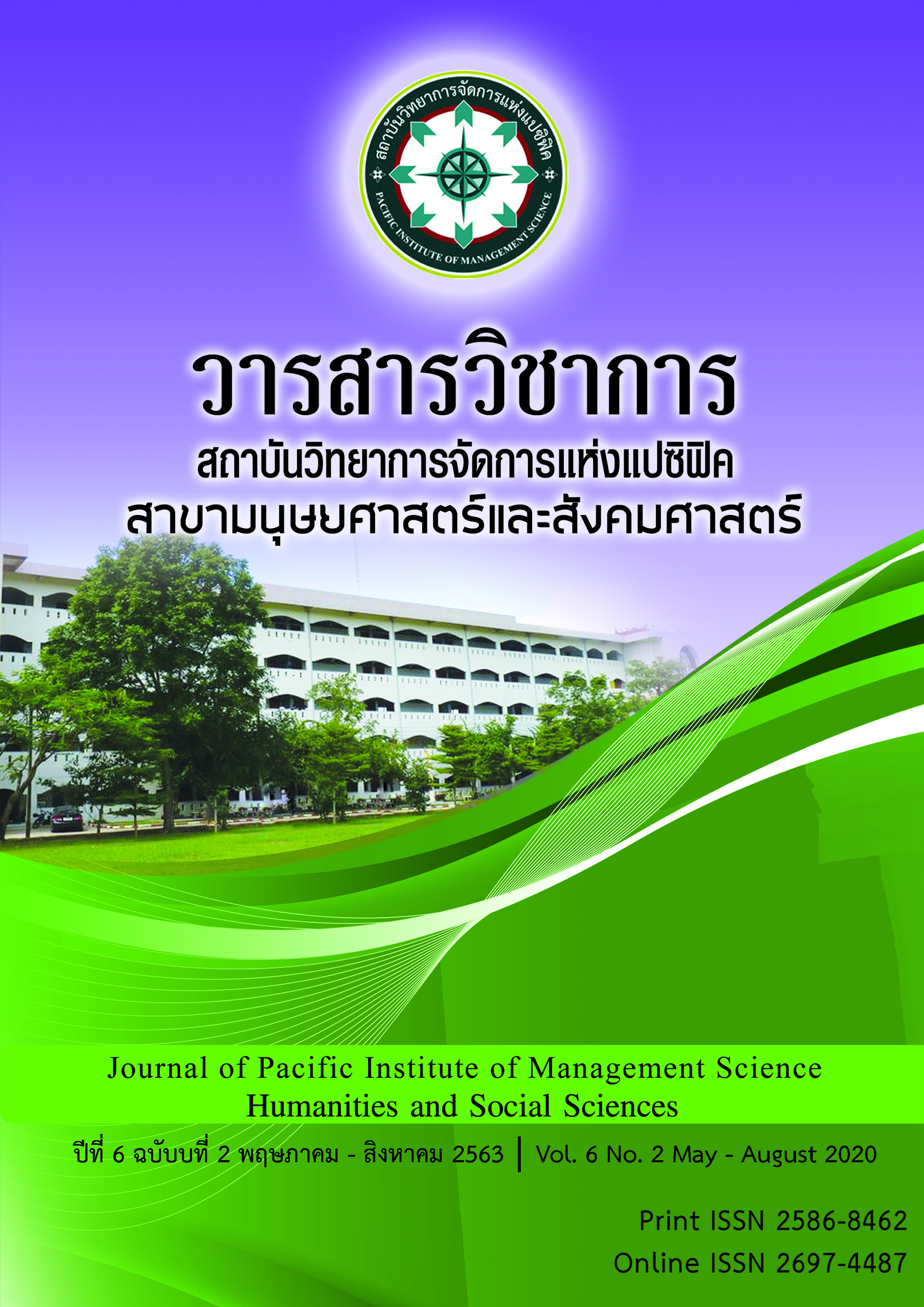Enable Factors in Community Development Achievement Based the Sufficency Economy Philosophy of Tambon Sikeaw Municipalities Mueang district Roi Et Province
Keywords:
Community Development, Sufficiency Economy Philosophy, Local Government OrganizationAbstract
The objectives of this research were: (1) to study factors contributing to community development success according to the Sufficiency Economy philosophy of the community of Si Kae Subdistrict Municipality, Mueang District, Roi Et Province (2) to study the level of success in Community development according to the Sufficiency Economy philosophy of the community of Si Kae Subdistrict, Mueang District, Roi Et Province By using a questionnaire to collect data from the sample group of people living in the community of Si Kaeo Subdistrict, Mueang District, Roi Et Province, number 264 people. The results can be summarized as follows :
1) Enable factors inducing to community development achievement based on “the Sufficiency Economy Philosophy” were the external and internal factors of the community. To illustrate, the external factors comprised the support from the public sector in arranging the training courses in the principles of the Sufficiency Economy Philosophy, budget allocation, and marketing provision for the community products. Additionally, the internal factors consisted of people’s participation in giving money for the community development activities, exchanging experience, and building community network for activities and occupation development. The external and internal factors highly related with the achievement.
2) Tambon Sikeaw Municipalities, Mueang district, Roi Et Province achieved in implementing the Sufficiency Economy Philosophy in community development practices and people in the high level. In an individual/family level, their way of life was in a Sufficiency Economy Philosophy practice without exploiting others. Family members were happy and satisfied with their current life status. Moreover, in the community level, there was a money saving group for the members’ circulating capital. There was also the money saving promotion campaign and the money saving group setting in producing the products of Tambon Sikeaw Municipalities, Mueang district, Roi Et Province.
3) According to the understandings and comprehension in the concept and principle of the Sufficiency Economy Philosophy, the study found that the majority of people in Tambon Sikeaw Municipalities, Mueang district, Roi Et Province. comprehended the principle of the Sufficiency Economy Philosophy in a high level.
4) Regarding the problems and obstacles of the community development according to the Sufficiency Economy Philosophy, the study revealed that people in the household/family level still lacked the accurate understandings and comprehension in making the income and spending account. They had a debt problem and lacked the eagerness in searching for knowledge or innovation to apply in daily life and develop their community based on the Sufficiency Economy Philosophy. In the community level, the study showed that the support and advocate in the Sufficiency Economy Philosophy from the relevant government sector was inconsistent. There was a lack of marketing sources for the community products and a lack of budget allocation for the community development activities. The community products were not varied and lacked quality and imaging development.
References
กังสดาล อยู่เย็น.(2554). “พลวัตชุมชนบ้านเปร็ดในภายใต้แนวความคิดเศรษฐกิจพอเพียง”. วิทยานิพนธ์สงเคราะห์ศาสตรมหาบัณฑิต คณะสังคมสงเคราะห์ศาสตร์ มหาวิทยาลัยธรรมศาสตร์
กำธน ไชยานนท์. (2548). ความรู้และความตระหนักที่มีต่อการดำเนินชีวิตบนพื้นฐานแนวคิดเศรษฐกิจพอเพียงของเกษตรผู้เข้าร่วมโครงการแปลงทรัพย์สินเงินทุนในเขตปฏิรูปที่ดินอำเภอจุน จังหวัดพะเยา. วิทยานิพนธ์ศิลปศาสตรมหาบัณฑิต, สถาบันบัณฑิตพัฒนบริหารศาสตร์ .
กุลวดี ล้อมทองวีระภัทรานนท์. (2550). การนำหลักปรัชญาเศรษฐกิจพอเพียงมาประยุกต์ใช้ในการ ดำเนินชีวิต ศึกษากรณีบุคลากรสำนักงานทรัพย์สินส่วนพระมหากษัตริย์. วิทยานิพนธ์ ศิลปศาสตรมหาบัณฑิต, สถาบันบัณฑิตพัฒนบริหารศาสตร์ .
เกษม ผดุงธรรม. (2553). การศึกษาเศรษฐกิจชุมชนเข้มแข็งตามแนวปรัชญาเศรษฐกิจพอเพียง กรณีศึกษาชุมชนบ้านเกษตรก้าวหน้า จังหวัดสระบุรี. วิทยานิพนธ์รัฐประศาสนศาสตร มหาบัณฑิต, มหาวิทยาลัยราชภัฏสวนสุนันทา.
คณะกรรมการขับเคลื่อนเศรษฐกิจพอเพียง. การประยุกต์ใช้ปรัชญาเศรษฐกิจพอเพียง. กรุงเทพฯ:สำนักงานคณะกรรมการพัฒนาการเศรษฐกิจ และสังคมแห่งชาติ, 2554.
ชัยอนันต์ สมุทวานิช. (2556). ทฤษฎีใหม่: มิติที่ยิ่งใหญ่ทางความคิด. พิมพ์ครั้งที่ 2 กรุงเทพฯ: บริษัทสุขุมและบุตรจำกัด, .
สุเมธ ตันติเวชกุล. (2543). ใต้เบื้องพระยุคลบาท.กรุงเทพฯม สำนักพิมพ์มติชน.
สุรศักดิ์ อมรรัตนศักดิ์. (2536). วิธีการวิเคราะห์ข้อมูลทางการศึกษา. กรุงเทพฯ, มหาวิทยาลัย รามคำแหง.
สุรางค์พิมล สายโรจน์. (2551). การประยุกต์ใช้ปรัชญาเศรษฐกิจพอเพียงในการดำรงชีวิตของคน กรณีศึกษาชุมชนสหชุมชน โครงการเขตสายไหม. กรุงเทพฯ. วิทยานิพนธ์ศิลปศาสตรมหา บัณฑิต, มหาวิทยาลัยรังสิต.
อนันต์ ศรีโสภา. (2525). การวัดผลและประเมินผลการศึกษา. กรุงเทพฯ, ไทยวัฒนาพานิช.
อภิชัย พันธเสน และคณะ.(2556). โครงการสังเคราะห์องค์ความรู้เกี่ยวกับเศรษฐกิจพอเพียง. กรุงเทพฯ:สำนักงานกองทุนสนับสนุนการวิจัย (สกว.).
อภิชัย พันธเสน และคณะ. (2549). สังเคราะห์องค์ความรู้เกี่ยวกับเศรษฐกิจพอเพียง. กรุงเทพฯ, โรง พิมพ์สำนักงานกองทุนสนับสนุนการวิจัย.
อรรถพล อุทุมพร. (2559) “การนำแนวคิดเศรษฐกิจพอเพียงไปปฏิบัติในองค์การบริหารส่วนตำบลหารแก้ว อำเภอหางดง จังหวัดเชียงใหม่”. การค้นคว้าแบบอิสระ รัฐศาสตรมหาบัณฑิตสาขาวิชาการเมืองและการปกครอง บัณฑิตวิทยาลัย มหาวิทยาลัยเชียงใหม่.
อัจฉรา ราชแก้ว. (2550). การทำปรัชญาเศรษฐกิจพอเพียงไปปรับใช้ในการดำเนินชีวิตของพนักงาน
ขับรถโดยสารประจำทาง จังหวัดปทุมธานี. ภาคนิพนธ์ศิลปศาสตรมหาบัณฑิต, สถาบัน บัณฑิตพัฒนบริหารศาสตร์ .
อำพล เสนาณรงค์. (2541). ประมวลพระราชดำรัสของพระบาทสมเด็จพระเจ้าอยู่หัวเกี่ยวกับทฤษฎีใหม่.กรุงเทพฯ: มหาวิทยาลัยธรรมศาสตร์.
อุดมพร อมรธรรม. (2549). ปรัชญาเศรษฐกิจพอเพียงพระเจ้าอยู่หัว. กรุงเทพฯ, แสงดาวการพิมพ์.
เอื้องทิพย์ เกตุกราย. (2551). การประยุกต์ใช้เศรษฐกิจพอเพียงในชีวิตประจำวันของคน ตำบลคลองพระอุดม อำเภอปากเกร็ด จังหวัดนนทบุรี. วิทยานิพนธ์ศิลปศาสตรมหาบัณฑิต, สถาบันบัณฑิตพัฒนบริหารศาสตร์.
Downloads
Published
Issue
Section
License
บทความที่ได้รับการตีพิมพ์เป็นลิขสิทธิ์ของ สถาบันวิทยาการจัดการแห่งแปซิฟิค
ข้อความที่ปรากฏในบทความแต่ละเรื่องในวารสารวิชาการเล่มนี้เป็นความคิดเห็นส่วนตัวของผู้เขียนแต่ละท่านไม่เกี่ยวข้องกับสถาบันวิทยาการจัดการแห่งแปซิฟิค และคณาจารย์ท่านอื่นๆในสถาบันฯ แต่อย่างใด ความรับผิดชอบองค์ประกอบทั้งหมดของบทความแต่ละเรื่องเป็นของผู้เขียนแต่ละท่าน หากมีความผิดพลาดใดๆ ผู้เขียนแต่ละท่านจะรับผิดชอบบทความของตนเองแต่ผู้เดียว







